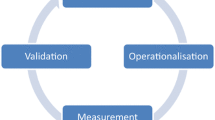Abstract
This article reviews three important recent collections of papers on assessment in mathematics education. It first examines the wider social framework of assessment and the influence of public assessment within the school system, both in inhibiting and promoting change. From a survey of the current state of assessment and common criticisms of it, three key trends are identified as forming a current agenda for reform in assessment: increasing the authenticity and realism of assessment tasks; increasing the interpretive quality of assessment information; and increasing the integration of processes of teaching, learning and assessment. These trends are explored in more detail, and critically appraised.
Similar content being viewed by others
References
Abrams, F.: 1991, ‘GCSE fails to eliminate inequality’,Times Educational Supplement 3894, 1.
Brown, M.: 1989, ‘Graded Assessment and Learning Hierarchies in Mathematics — an alternative view’,British Educational Research Journal 15(2), 121–128.
Brown, M., Johnson D., Askew M., Millett A., Prestage S. and Walsh A.: 1993,National Curriculum Evaluation: Mathematics at Key Stages 1, 2 and 3, School Curriculum and Assessment Authority, London.
Cohen, P. C.: 1982,A calculating people: the spread of numeracy in early America, University of Chicago Press, Chicago.
Howson, A. G.: 1982,A History of Mathematics Education in England, Cambridge University Press, Cambridge.
Lesh, R. and Lamon S. J.: 1992,Assessment of Authentic Performance in School Mathematics, American Association for the Advancement of Science Press, Washington DC.
Newman, D., Griffin P. and Cole M.: 1989,The construction zone: Working for cognitive change in school, Cambridge University Press, Cambridge.
Niss, M: 1993a,Investigations into Assessment in Mathematics Education, Kluwer, Dordrecht.
Niss, M: 1993b,Cases of Assessment in Mathematics Education, Kluwer, Dordrecht.
Noss, R., Goldstein H. and Hoyles C.: 1989, ‘Graded Assessment and Learning Hierarchies in Mathematics’,British Educational Research Journal 15(2), 109–120.
Ruthven, K.: 1987, ‘Ability Stereotyping in Mathematics’,Educational Studies in Mathematics 18, 243–253.
Treffers, A.: 1987,Three Dimensions: A Model of Goal and Theory Description in Mathematics Instruction — The Wiskobas Project, Reidel, Dordrecht.
Walkerdine, V.: 1988,The Mastery of Reason, Routledge, London.
Author information
Authors and Affiliations
Rights and permissions
About this article
Cite this article
Ruthven, K. Better judgement: Rethinking assessment in mathematics education. Educ Stud Math 27, 433–450 (1994). https://doi.org/10.1007/BF01273382
Issue Date:
DOI: https://doi.org/10.1007/BF01273382




